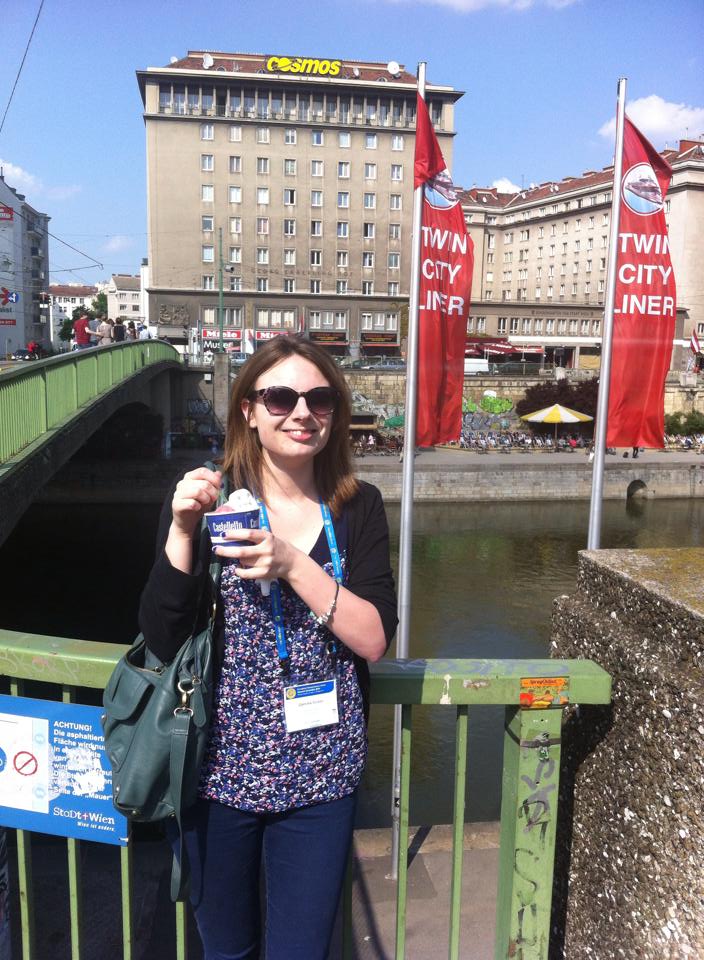Introducing… Gemma Coxon
For the second ‘Introducing…’ blog post I invited Gemma Coxon to introduce herself and her work to the HEPEX community. Gemma is an early-career researcher at Bristol University.
Gemma Coxon at EGU
Liz: Hello! Can you introduce yourself in a couple of sentences?
Gemma: Hi, my name is Gemma Coxon and I am a post-doctoral research assistant at the University of Bristol working as part of the MaRIUS project (Managing the risks, impacts and uncertainties of droughts and water scarcities).
Liz: How long have you been doing HEPEX-related work?
Gemma: Although I have never been directly linked to HEPEX work, a lot of the research I have done to date has been focused on uncertainties in hydrological modelling, data and predictions. My PhD was focused on characterising and quantifying discharge uncertainties, exploring which model diagnostics are useful for model identification and evaluation and assessing the impact of discharge uncertainties on large-sample hydrological model predictions. I am now seven months into my post-doc and continuing to use hydrological models but with a focus on droughts instead.
Liz: What is the best/worst thing about ensembles?
Gemma: The best thing about ensembles is being able to reflect part of the uncertainty associated with making hydrological predictions. I also think ensembles are integral to learning about your model(s) and always good when they show you something that you were not expecting! The worst thing about ensembles is when your code breaks trying to process them all.
Liz: What/who inspires you?
Gemma: I am very lucky to work with a great group of people at Bristol who motivate me on a daily basis. I also like getting my hands on new data – learning something new is always inspiring.
Liz: Are there any papers or talks that you want to shamelessly publicise?!
Gemma: Of course! If you would like to know more about my PhD work then I would take a look at the paper we published in Hydrological Processes last year on model diagnostics and also the paper we recently published in Water Resources Research on a novel method for estimating discharge uncertainty. If you are interested in the project I am on at the moment then I would take a look at the MaRIUS website.
Liz: What are you currently working on?
Gemma: Most of my time at the moment is spent working on the development and application of national scale hydrological models. The main aim is to improve the representation of drought processes within these models, but we will also have a strong focus on model structural uncertainty (i.e. which model structural choices are important when modelling drought processes) and uncertainty in the data we use to drive and evaluate these models. Once we have set up the model, the idea is to run an ensemble of future drought events through our national scale hydrological model to investigate the changing risk of droughts in the UK. I am also currently analysing historic drought events from several national UK hydrological datasets to gain a better understanding of drought processes and to explore the impacts on river flows and water quality.
Liz: Where would you like your research to take you in the long run?
Gemma: Hopefully to a permanent lectureship at some point! But the main focus at the moment is to apply for a fellowship in a couple of years time and to keep on doing fun, exciting research.
Liz: Where do you think HEPEX will be in 5 years time?
Gemma: Continuing to push the boundaries of hydrological ensemble predictions and hopefully inspiring a new bunch of early career scientists!
Liz: Are there any meetings/conferences you will be attending where we can say hello to you?
Gemma: I should be going to AGU this year and will definitely be at EGU in April – please come and say hello.
Liz: Is there a question that you would like to ask the HEPEX community?
Gemma: I have two questions actually..!
Firstly, I am just starting my work using ensembles from climate models – does anyone have any tips/words of warning…!?
Secondly, I keep on going to the same conferences (EGU and AGU), does anyone have any recommendations on other good workshops/conferences to go to over the next couple of years?

August 25, 2015 at 14:01
Try ems:
http://www.ems2015.eu/
This year in Bulgaria (soon) and next year in Trieste.
Always a session on Interfacing hydrological and meteorological models in forecasting system suiting for HEPEX contributors
http://meetingorganizer.copernicus.org/EMS2015/session/19120
August 26, 2015 at 02:44
Also for conferences,
– the next workshop on seasonal forecasting has already its agenda online: https://hepex.inrae.fr/hepex-workshop-on-seasonal-hydrological-forecasting/
– the workshop that will take place in 2016 in Quebec “Ensemble for better hydrological forecasts” will be an opportunity to discuss together several topics of interest to hydrological ensemble prediction: https://hepex.inrae.fr/2016-hepex-workshop/
– and there may have another forecasting session during the next IAHS in 2017. The last IAHS meeting was in June in Prague, and we had a nice session there too: https://hepex.inrae.fr/from-research-to-operations-and-vice-versa-feedback-from-the-hepex-session-at-iuggiahs-workshop/
Looking forward to seeing you in one of these meetings!
August 26, 2015 at 20:14
Nice to meet you, Gemma!
I am not used to ensemble of climate models but for weather ensemble prediction systems from different models (ex. TIGGE), a challenge I have faced with my students is to consider the ‘good’ and the ‘bad’ models all together, as we never know if the ‘good’ (‘bad’) ones will always be good (bad) or not.
I hope to hear more about your work here in the HEPEX blog or in the next conferences!
August 26, 2015 at 20:17
Ps.: something also good to note about the ‘Introducing…’ series that Liz Stephens is promoting in HEPEX is the first post she published some time ago: https://hepex.inrae.fr/introducing-fernando-mainardo-fan/
Thanks Liz for keeping this going on!
August 27, 2015 at 03:12
Hi Gemma,
Nice to meet you.
About the climate models I have some experience. And I would say that bias correction is a very important step.